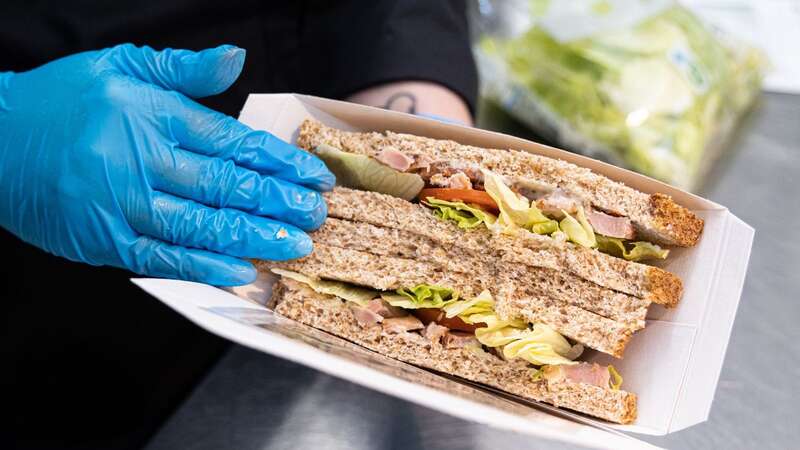
An E-coli outbreak in the UK has now led to the death of one person and 86 hospitalisations - but how concerned should we actually be?
It's believed the outbreak was caused by some supermarket sandwiches, wraps and salads containing contaminated salad leaves, with The UK Health Security Agency (UKHSA) reporting 275 confirmed cases of infection. The individual who died passed away in May, and is said to have had underlying health conditions.
Tests have shown the majority of cases reported between May 25 and June 4 were part of a single outbreak, connected to nationally distributed food items. These products, which were sold at major retailers including Sainsbury’s, Asda, Aldi, Morrisons, Co-op, Boots, Tesco, One Stop and WH Smith, have now been recalled as a precaution.
Darren Whitby, head of incidents at the Food Standards Agency (FSA), has stated that the recalls were a 'precautionary measure', adding: “This is a complex investigation, and we have worked swiftly with the relevant businesses and the local authorities concerned to narrow down the wide range of foods consumed to a small number of salad leaf products that have been used in sandwiches and wraps."
As of June 25, there have been a further 19 cases of E.coli - sometimes referred to as shiga toxin-producing E.coli (Stec) - bringing the total number of confirmed cases in the UK to 275. Here, experts weigh in on how worried Brits should be.
 TUI customers' food poisoning torment ruined four-star Lanzarote New Year trip
TUI customers' food poisoning torment ruined four-star Lanzarote New Year trip
According to health experts, the E.coli bacteria, commonly found in the gut and faeces of a number of animals – particularly cows - and humans, usually isn't harmful.
However, it can occasionally cause symptoms including diarrhoea (which can be bloody), stomach cramps and fever, lasting from one day to two weeks. A small number of people with E.coli can also develop a serious condition known as haemolytic uraemic syndrome (HUS), which can in some rare instances lead to kidney failure and even death.
As per the NHS, a person can catch E.coli, by eating contaminated food including raw leafy veg or undercooked meat. Contamination can also occur after touching infected animals, being in contact with those who have the illness, drinking from an inadequately treated water supply, or swimming in contaminated ponds or streams.
It's therefore important to wash your hands regularly, keep food preparation areas clean, and serve food at the correct temperature.
Steve Busby, a professor of biochemistry at the University of Birmingham who studies bacteria including E.coli, explained: "People need to understand the big picture about E.coli – we all have it, and it's also in the intestinal tracts of cattle, chickens, dogs and all domestic animals and pets, and 99.99 per cent of the bacteria are totally harmless. But just occasionally you do get a strain that has a genetic determinant that can cause harm."
Cooking food and staying clear of animal poo will usually protect against harmful E.coli, however, occasionally some will break through our defences - as has happened in this instance. Stating that the FSA has done a 'superb job' of managing this recent outbreak, Professor Busby stated: "Most people who come across one of the harmless strains will probably not know about it, or you might spend the night in the bathroom. But if you're a child, if you're immunocompromised or elderly, that's when it can be life-threatening."
Considering whether there was anything to worry about, he continued: "Should we be worried about the current outbreak? Yes, of course we're worried about the outbreak. We're always concerned about things that cause harm to humans, but we should be concerned and not worried, because it's not something we’re going to get rid of.
"History tells us that 99.99 per cent of these things are totally harmless – you've got more chance of being run over by a bus than being killed by E.coli."
However, taking a different view, Superdrug Online Doctor Dr Babak Ashrafi, has described this outbreak as a 'significant public health concern', particularly for more vulnerable groups such as children, the elderly, and individuals with weakened immune systems.
Dr Ashrafi warned: "While there's no need to panic, as public health authorities have taken swift action, issuing alerts and recalling potentially contaminated products, it's important that people stay informed, are extra-cautious with regards to food handling, and remain vigilant for any symptoms over the coming weeks."
 Stomach churning photos show inside Chinese takeaway hit with £6,000 fine
Stomach churning photos show inside Chinese takeaway hit with £6,000 fine
The medic went on to explain that this particular strain of E-coli produces the Shiga toxin, which can result in severe gastrointestinal symptoms including intense abdominal cramps, bloody diarrhoea, and vomiting, with signs usually emerging within two to eight days of exposure.
He went on to assert: "The greatest concern lies in the potential development of HUS, a serious complication posing a particular threat to young children and the elderly. HUS can lead to kidney failure and anaemia, which will require urgent care.”
While most infection cases tend to resolve on their own, Dr Ashrafi has stressed the importance of seeking medical advice if you or a loved one are exhibiting symptoms, while making sure to rest, drink plenty of fluids, and take rehydration solutions if required.
He cautioned: "Antibiotics are generally not recommended for treating STEC infections as they can potentially worsen the release of toxins and increase the risk of HUS."
Read more similar news:
Comments:
comments powered by Disqus
































